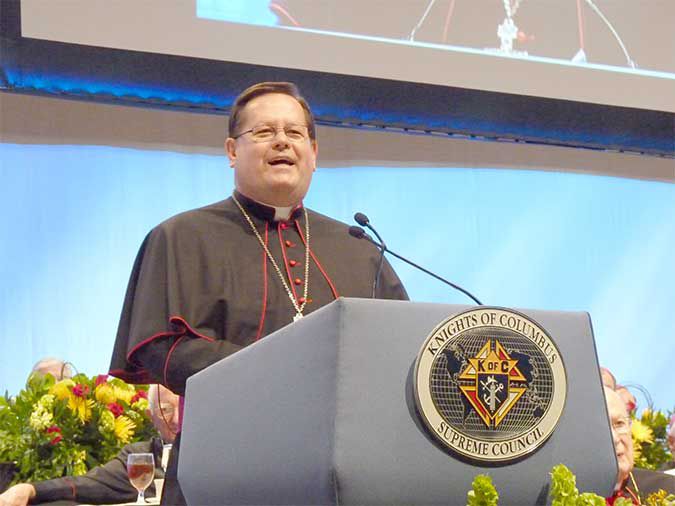The 19 men chosen to be named cardinals in February stress Pope Francis' attention on the peripheries of the Church, and that appointment to a major diocese no longer automatically comes with a “red hat.”
The 19 will be elevated to cardinal at a consistory held Feb. 22. Three will be over the age of 80, and thus ineligible to vote in the election of the next Pope.
Of the 16 voting cardinals, nine come from South America, Africa and Asia, thus increasing the weight of the “Global South” in the college of cardinals.
There are only three cardinals from the “north of the world” who administer dioceses, while four officials of the Roman Curia are being appointed by virtue of their office.
Archbishops Pietro Parolin, Secretary of State; Beniamino Stella, Prefect of the Congregation for the Clergy; and Gerhard Müller, Prefect of the Congregation for the Doctrine of the Faith, all receive the cardinalate by virtue of their office, according to “Pastor bonus,” the document governing the Curia.
Archbishop Lorenzo Baldisseri, Secretary General of the Synod of Bishops, will also be appointed a cardinal. Upon his election as Bishop of Rome, Pope Francis had given his own red biretta to Archbishop Baldisseri.
Archbishop Baldisseri's name was read second in the list of new cardinals, a seemingly important signal.
The list customarily follows strict rules of precedence: curial cardinals are listed first, by order of importance. That Archbishop Baldisseri was named second, behind only the Secretary of State, may be a signal of Pope Francis' increasing focus on synodality.
In choosing his first round of cardinals, Pope Francis wanted to highlight the pastoral experience.
Archbishop Gerald Lacroix of Quebec was for ten years a missionary in Colombia as part of the Pius X Secular Institute; Archbishop Orani Tempesta of Rio de Janeiro is known for his tireless presence in parishes; Archbishop Andrew Yeom Soo-jung of Seoul was a parish priest in his diocese for 28 years; and Archbishop Philippe Ouedraogo of Ouagadougou, in Burkina Faso, served as a priest for 23 years before being consecrated a bishop.
Archbishop Ricardo Ezzati Andrello of Santiago de Chile, a Salesian, worked in many of the pastoral and educational structures linked to his congregation.
Pope Francis' appointments also give strong signals against careerism in the Church, and clericalism.
In the past, it was taken for granted that being bishop of certain dioceses brought with it a cardinal appointment. This practice led to “ecclesiastical lobbies,” advocating that certain men be given particular dioceses of curial appointments.
Yet Pope Francis decided not to award some Vatican dicasteries, nor some important dioceses, with “red hats.”
In Italy, neither the Archbishop of Turin nor the Patriarch of Venice were named. Also excluded were the archbishops of Malines-Brussels, Tokyo and Bangkok.
On the other hand, Pope Francis granted the Philippines a second cardinal of voting age, choosing Archbishop Orlando Quevedo of Cotabato, one of the poorest regions of the country.
Three countries received their first cardinal: from Haiti, Bishop Chibly Langlois of Les Cayes, who is only 55; from Nicaragua, Archbishop Leopoldo Brenes Solorzano of Managua; and from Ivory Coast, Archbishop Jean-Pierre Kutwa of Abidjan.
Among the non-voting cardinals, honored were Archbishop Loris Capovilla, Prelate Emeritus of Loreto, 98, who was secretary to Blessed John XXIII (and former prelate of the Shrine of Loreto); Archbishop Emeritus Kelvin Felix of Castries, Saint Lucia, in the Antilles; and Archbishop Emeritus Fernando Sebastian Aguilar of Pamplona and Tudela, Spain.
Of the cardinals-to-be, five are from Latin America; two are from Asia; two are from Africa; one is North American, and six are European. Others named include Archbishops Vincent Nichols of Westminster, Great Britain; Gualtiero Bassetti of Perugia-Citta della Pieve, Italy; and Mario Aurelio Poli of Buenos Aires, Argentina.
While the number of voting cardinals was set by Paul VI at 120, Pope Francis' appointments will have surpassed the limit by two; but by the end of the year, 20 cardinals will have reached their 80th birthday. Since the election of Pope Francis, nine have already passed 80.
In a letter sent to the future cardinals, the Holy Father told the cardinals-elect that “the cardinalship does not imply promotion.”
“It is neither an honor nor a decoration,” he said. “It is simply a service that requires you to broaden your gaze and open your hearts. And, although this may appear paradoxical, the ability to look further and to love more universally with greater intensity may be acquired only by following the same path of the Lord: the path of self-effacement and humility, taking on the role of a servant.”
Therefore he urged the new cardinals “to receive this designation with a simple and humble heart. And, while you must do so with pleasure and joy, ensure that this sentiment is far from any expression of worldliness or from any form of celebration contrary to the evangelical spirit of austerity, sobriety and poverty.”
The day after the consistory, the Holy Father will preside at a solemn concelebration with the new cardinals. On Feb. 20 and 21 he will hold a consistory with all the cardinals to reflect on the theme of the family.
---Catholic News Agency

